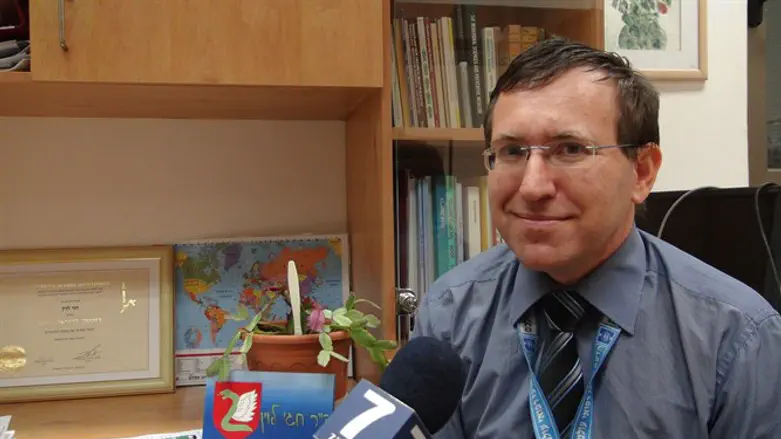
The Chairman of the Association of Public Health Physicians, Prof. Hagai Levin, claims that the third closure is a mistake that represents a broader problem in coronavirus crisis decision-making.
"Unfortunately, despite warnings from public health doctors, the government has chosen the wrong path of coercion and over-aggravation without distinguishing between red and green areas and without understanding that in the end internal motivation of people needs to be promoted. The government is unable to communicate with the public and there is a disconnect between what needs to be done and the government's forceful activities," Levin said in an interview with Arutz Sheva.
"We are in the Twilight Zone of COVID-19. It is clear that there is significant morbidity in Israel and we must act in a way that reduces infections and morbidity, precisely when we're conducting a life-saving vaccine operation and within a few weeks the population will be much better protected. We must not lose a life that could be saved, and therefore we all need to be much more careful and follow the guidelines."
Prof. Levin says that "what actually happens is that because of the statements and the attempt to control the public during the epidemic, trust was lost and caution was reduced. The response should have been to return to the base and work with the public. Therefore, I think that the result of the closure policy is that we will not control the level of morbidity well, and, on the other hand, we'll disrupt normal life."
He also has examples of trust-breaking moves. "I wonder, for example, why a 'takeaway' should be stopped? It is clear that it allows zero-risk activity and allows little oxygen to both the public and business owners. On the subject of those entering the country, we explained that it is not right to forcibly take people to hotels but to send them home. Only now does the government realize that this was a mistake. That's how you erode the public's trust in the guidelines.
"When decisions are illogical, the public does not follow them. I do tell the public that we need to be careful for a few more weeks, regardless of government directives. Everyone should see themselves as if they could infect. We need to take care of health, invest and make sure that decision-making is based on data and not on a political basis," adds Prof. Levin.
He praises the Israeli vaccine system: "The activity of the public health system is a source of pride. It is not for nothing that we are in a situation where the rate of vaccination is high and it is good that we are first in this positive matter.
"It is important to say that even the non-high-risk population should be vaccinated. It is currently complex because there is a preference for vaccinating those who are at the highest risk of infection and then reach the general population as well. In the end, there are also complications in young people, so the vaccine is good for everyone over the age of 16," concludes Prof. Levin.
Tel Aviv University Coronavirus Laboratory head Professor Ariel Munitz told Israel News Talk Radio: “As an immunologist, I think that vaccines are one of the greatest inventions in medicine.”
He continued: “Nonetheless, I do not think that they should be forced. In addition, I see no sense in vaccinating populations that are not at-risk.”
Health Communication Lecturer at IDC Herzliya International School Dr. Yaffa Shir Raz has spoken in a similar vein to Dr. Levin. She told Arutz Sheva: "A few months before COVID-19, there was a discussion in the WHO on how to treat 'vaccine hesitancy' and resistance to vaccines. Senior World Health Organization anthropologist and immunization expert Dr. Heidi Larson explained that people who are afraid of vaccines should not be called 'anti-vaxxers', because this approach only leads to antagonism and the opposite result - of increasing the number of people who refuse or are afraid to get vaccinated. She literally called on them to stop with that.
"She said it was time to change direction - invest in new research, stop persecution, and get rid of inflammatory language. Then, she clarified, will it be possible to try to rebuild trust in the system. One of our biggest challenges is to get rid of the term 'anti-vaxxers'. Get rid of hostile language and start having more conversations. Be open to questions, make people feel they should not be judged when they ask questions."
Shir Raz concluded: "The data that Dr. Larson presents in her lecture is nothing short of amazing: The direct result of the intimidation and disqualification strategies taken by the authorities, encouraged and funded by vaccine manufacturers, is that within ten years, from 2008 to 2018, public trust in vaccine safety has plunged from 85% to about 75%, and the belief in the benefit of vaccines decreased from 75% to less than 60%.
"When parents were asked about the reasons for their hesitation to vaccinate, the leading reason - almost 3 times more any other argument - was fear for the safety of vaccines. 'Safety is the biggest fear,' Prof. Larson repeated. 'Fear of side effects'."
